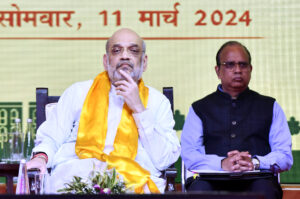US backs New Delhi on India-China border flare-up
[ad_1]
The US on Wednesday came out strongly in support of India when it came to the boundary question and the recent border skirmishes between India and China.
Addressing an online press briefing, Ambassador Alice G Wells, Principal Deputy Assistant Secretary, Bureau of South and Central Asian Affairs said the behaviour of Beijing was provocative and “disturbing”.
“The flare-ups on the border as a reminder that Chinese aggression is not always just rhetorical. Whether it is on the South China Sea, or along the border with India, we continue to see provocations and disturbing behaviour by China that poses questions about how China seeks to use its growing power,” she said.
The outgoing head of the South Asia and Central Asia Bureau emphasised the need for like-minded countries to come together. The US has been pushing for a more assertive role for the QUAD in the maritime space where Chinese aggression has increased lately.
“Thats why you’ve seen a rallying of like-minded nations whether it’s in ASEAN or through other diplomatic groupings like the trilateral with the US, Japan and India, or the QUAD; conversations globally, about how we can reinforce the principles of the post World War II global order that supported free and open trade… In this, incidents like the border disputes are a reminder of the threat by China,” said Ambassador Wells.
These remarks come in the backdrop of escalated tensions at the Line of Actual Control (LAC) between the armies of the two countries in Sikkim and Ladakh.
Hitting out at China on the issue of the China-Pakistan Economic Corridor (CPEC), the US official also said that in the times of Covid-19, China should stop its “predatory” dealings with Pakistan.
“US has expressed concerns over the lack of transparency, the unfair rates of profit that are guaranteed to Chinese organisations. At a time of Covid-19 crisis, China should stop this predatory lending,” said the top US official.
The briefing also touched upon the issue of peace process with the Taliban and New Delhi’s role in Afghanistan.
To a specific question on whether if India should engage the Taliban, Ambassador Wells said, “It is up to India to determine how best to support the peace process… India is going to be a critical player which is why Ambassador Khalilzad travelled to New Delhi during the height of the Covid lockdown.”
Asserting that a “healthy” Afghanistan depended on a “healthy relationship” with India, she added that it was for India to decide “whether it wants to engage directly with the Taliban, but in a situation where we are seeking to have a political settlement to have the Taliban as part of that political government structure, that government’s relationship with India should be close. A healthy Afghanistan is going to need to have a healthy relationship with India.”
As an officer who is going to step down end of this month, spelling out Washington DC’s achievements on the Pakistan front she said that it was because of America’s “resolve” that Islamabad took action against terrorists and terrorist organisations on their soil, pointing to the success of President Donald Trump’s South Asia Strategy of 2017.
Wells mentioned the arrest of globally designated terrorist Hafiz Saeed and firm move toward the Afghan peace process were only possible because of the freeze of funds to Pakistan.
“President Trump’s suspension of security assistance in January 2018 demonstrated our resolve. Since then we have seen constructive steps by Pakistan to encourage the Taliban to advance the peace process.
Pakistan has also taken initial steps toward curtailing other terrorist groups that threaten the region such as arresting and prosecuting Lashkar-e-Taiba leader Hafiz Saeed and beginning to dismantle terrorist financing structures.”
She also said, “Seeking to hold Pakistan accountable for the presence of terrorists and militant groups on its soil, the strategy made clear that Pakistan needed to take decisive action against these groups, particularly those that support the conflict in Afghanistan and threaten regional stability.”
India is not only facing border tensions on the China front, but with Nepal as well. While many say that Nepal’s revision of its political map incorporating territories that Indian claims as its own, could be influenced by Beijing; on a separate matter, the Americans have pinned their hopes on the fierce sovereignty that Nepal exhibits.
To a question on grants to Nepal and how much does that influence their decisions, Alice Wells said, “In some cases the grant assistance has become a political football. I am confident that the government of Nepal is sovereign, that it does not take dictation from China. It does what is in the best interests of its country. The MCC is one of many US programmes to help Nepal develop. And we hope the Nepali leadership will stand up for the people of Nepal.”
[ad_2]
Source link






